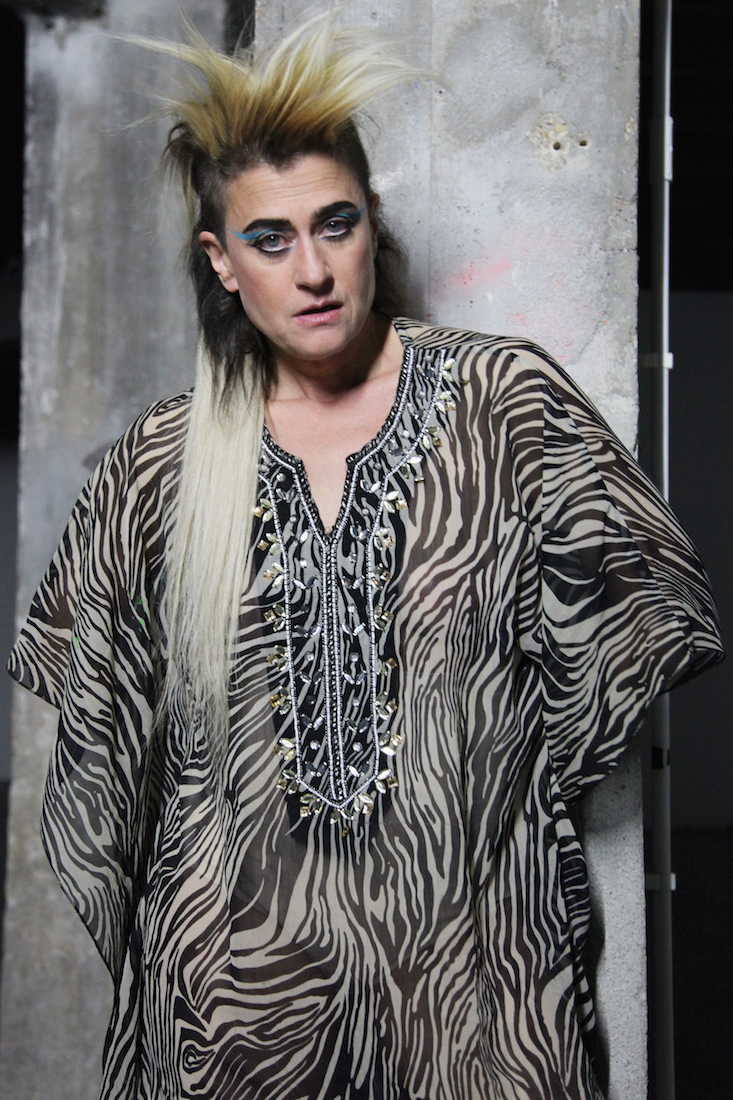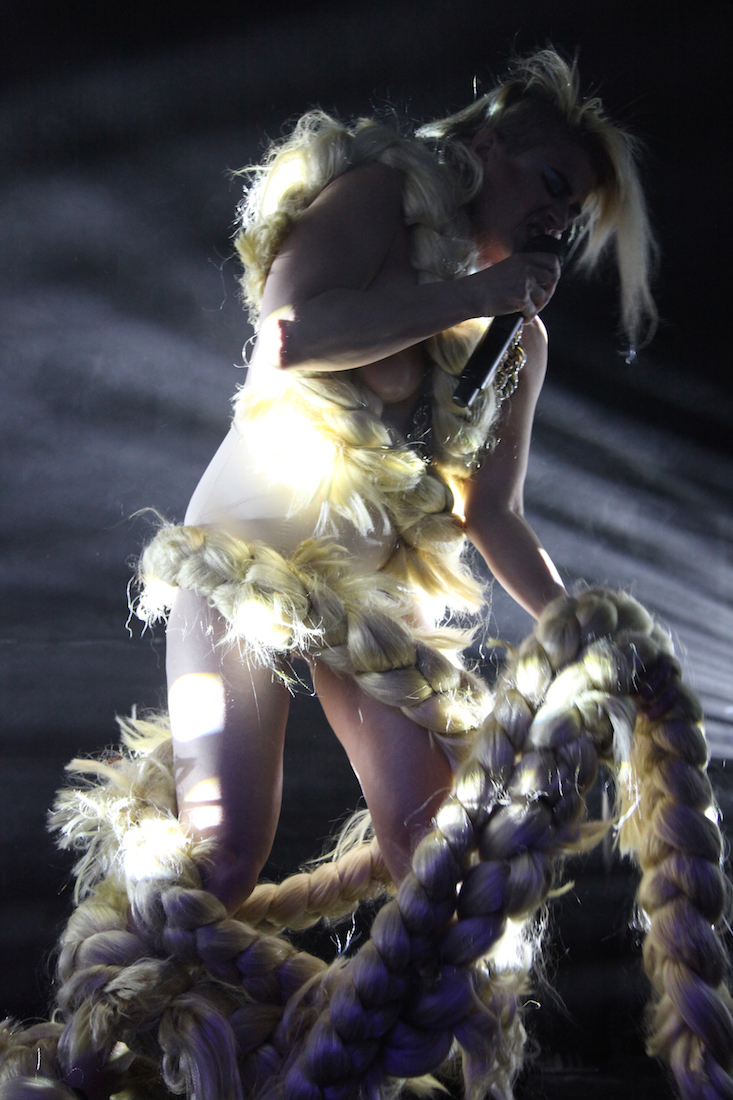Peaches (née Merrill Nisker) has long sneered at gender conformity, championing feminist ideology and sexual abandon. The rest of the world has been playing catch-up. Over the course of five electric, writhing albums — including her most recent, Rub — Peaches’ incendiary musical output has at times been dismissed as gratuitously “shocking.” She is unapologetic about pubic hair and aging. She excels at brilliantly explicit double entendres. And she is just as likely to fling a vocabulary of “clits,” “tits,” and “dicks” around as examine the loaded language that does make her uncomfortable (she called her 2003 album Fatherfucker to draw attention to the discomfiting ubiquity of the word “motherfucker”). But at the core of her provocative antics is a desire to facilitate a discussion, one that helps deconstruct gender norms and celebrates uninhibited selfhood.
This past weekend, Peaches took part in DO DISTURB!, an experimental performance extravaganza at the Palais de Tokyo in Paris, doing a guest performance for her long-time friend, French wig designer and sculptor Charlie Le Mindu. The dictum “Do Disturb” is a perfect fit for Peaches, who relishes disrupting assumptions about gendered behavior and sexual mores. Just take the lyrics to her single “Rub,” on which she intones flatly, “Can’t talk right now, this chick’s dick is in my mouth.”
Backstage at the event — as nearby performers smeared their naked bodies with white paint, and a wheelchair sat unoccupied apart from a pair of prosthetic legs in heels — Peaches nestled into a velvet couch and spoke to us about the importance of humor, her disgust with American politics, and her bafflement at the media gatekeepers who assume she’ll go haywire if anyone dares put her on late-night TV.
What does the concept of “disturbance” mean to you?
We [performers] all fit into that. Don’t take [anything at] face value, and continue being expressive with what you want.
You’ve been getting more multidisciplinary over the past five years — making a one-woman rock-opera remake of Jesus Christ Superstar and the film Peaches Does Herself — as well as your music and DJ sets. How do you decide where to funnel your creativity?
I just do what I do. I don’t call myself just a musician, or just a political artist, or someone just concerned with gender reconstruction. Everything I like all fits in together. It disturbs people, in the way that they go, like, “How can electronic music be humorous?” or “Is this performance or music?” I just keep doing it. Maybe I’m accepted now, maybe it’s trending — maybe I’m trending. But I don’t care.
Can you have a different kind of discourse with an audience today, now there’s a growing general cultural conversation around these topics?
I think that people are more open to the discourse. Before, they were more afraid, or found me alienating. They were willing to just accept the patriarchal view the way that it was. I think people are more open and understanding [now] — but I think there’s a group of people who are way more afraid of it, so don’t be under the impression that everything is going in that direction.
Because otherwise, [something like] Do Disturb! would be happening all the time. It’s a constant struggle, and the point is: live your life. I’m not saying everybody get naked and walk around. Just stand up for yourself and be who you need to be.
How did you find that kind of strength?
I think it was a sort of a gradual non-acceptance of a status quo. And just trying it out.

You’re living between Europe and the U.S. Do you feel that the conversations around gender and identity are evolving differently in those contexts?
Well, they’re both in very tough situations right now. Europe is under constant terror threat, which obviously makes people afraid to express themselves. It’s difficult, because you really hope that people won’t stop — that’s exactly what they want to happen. And then in America you have Trump, who’s retweeting white supremacists, [which means] less media attention for someone like Bernie Sanders, who really, actually wants to be making a change, and a revolution.
I think both places are in these sort of interesting — interesting is not really the word — very combative times. Where the discourse about sexual freedom, or the freedom of being who you need to be, [bumps up against] right-wing religious groups. Everybody can find everybody, and don’t be under the illusion that things are getting better, because they’re exponentially growing in every direction. You can get someone like Bernie Sanders, who’s not a Democrat, and someone like Donald Trump, who’s not a Republican.
It’s weird that it’s so binary — there’s this return towards antiquated views, and also this flexibility about gender and otherness.
Yeah, it’s crazy that it’s happening at the same time, at such extreme levels.
Can you talk about the role of humor in performance?
I do what I do with humor but not, like, too “Ha ha ha!” Just to, like, bring people in. I think it’s always really important. You’ll still be taken seriously if you don’t take yourself too seriously — it doesn’t mean that you’re not doing important work. When people smile, it breaks down a barrier.
Feminist comedy is really fantastic right now — like Broad City. Tina Fey was instrumental in starting all of that. I think some of the young women on SNL are really incredible. And political. Because it’s such a fucked-up time right now in America.
I still have a little dangerous element; I don’t clean it up. They still won’t let me perform on American late-night TV. Every single one of those people have said no.
Because of your lyrics?
I don’t know. They’re afraid that I’m going to get naked… there’s always some weird discussion. Every single [show] has said “no” over the last 16 years. But I’m allowed to be on something like the Larry Wilmer show, where I can discuss issues. I’m taken “seriously” as an artist, but I’m not allowed to perform on television. And it’s the same with major American festivals that will not book me: Coachella, Bonnaroo, all these really popular festivals. Because they’re afraid. But the ones that do book me, I’m very popular at them! Everyone comes to see it, and sees how much fun it is — how inclusive it is.
VOTE for i-D at this year’s Webby Awards for Best Fashion And Beauty Website
Credits
Text Sarah Moroz
Photography A. Cenno
